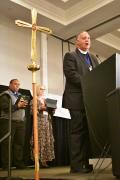The work of seeking racial justice is founded on our Baptismal Covenant, that “we will seek and serve Christ in all persons, loving your neighbor” as ourselves and to “strive for justice and peace among all people, and respect the dignity of every human being.” (Book of Common Prayer, p. 305)
As together we in this diocese strive to become a more antiracist body, the Racial Justice Commission exists to provide tools, experiences, leadership, accompaniment and, sometimes, challenge to diocesan leaders, congregations and other Episcopal communities--so that together, our diocese can better live out Jesus' prayer to embody God's dream of "on earth as it is in heaven."
The 12-member commission in its current configuration was launched in November 2020 at Diocesan Convention. The commission is organized into five subcommittees, each with two co-chairs and a mandate to support the broader mission.
Watch the video recording of the Racial Justice Commission's report to the 2024 Diocesan Convention here. The commission's written report--including the resolution adopted by the convention to implement a new antiracism formation program, "Dismantling Racism through Racial Healing"--is available in the 2024 Diocesan Convention Handbook (page H-15) here.
The leadership of our Racial Justice Commission includes:
Co-chairs:
• The Rev. W. (Will) H. Mebane Jr., St. Barnabas's Church, Falmouth
• The Rev. Carol Morehead, Grace Church, Medford
Contact the co-chairs at RJC@diomass.org.
Staff liaison:
The Rev. Canon Jean Baptiste Ntagengwa
(jbntagengwa@diomass.org or 617-482-4826, ext. 400)
Tools and resources
Subcommittees and mandates
Structures and Systems
Co-Chairs:
The Rev. Derrick Muwina (St. Peter's Church, Cambridge)
The Rev. Debbie Phillips (Grace Church, Salem)
Responsibility: Work with diocesan staff, clergy and lay leadership to create accountable and transparent structures in our diocese and Episcopal communities. This includes (but is not limited to) hiring practices, committee make-up, search-committee processes and business practices.
Finances
Co-Chairs:
The Rev. Morgan Allen (Trinity Church, Boston)
The Rev. Paul Minor (All Saints' Church, Belmont)
Responsibility: Ensure financial resources are located in ways that promote antiracism--on the diocesan and congregational level. This includes, but is not limited to, how resources are allocated in the diocese, how compensation is set and justly compensating BIPOC for often unpaid volunteer labor.
Supporting BIPOC Individuals and Communities
Co-Chairs:
The Rev. Jennifer Beal (St. Anne's Church, North Billerica)
The Rev. Ted Cole Jr. (St. John's Church, Jamaica Plain)
Responsibility: Help create the culture and structures in our diocese to build a beloved community where all are transformed; and where:
• BIPOC individuals and communities, especially the historically Black churches, feel welcomed, supported, sustained, embraced, respected and empowered; and especially in the leadership of our diocese;
• their voices are listened to and lifted up;
• their talents, skills and experiences are valued;
• our ordination, nominating and other processes to raise up lay and ordained leaders elevate and celebrate BIPOC;
• BIPOCs and people who are white work alongside each other as equals.
Reparations
Visit www.diomass.org/reparations-fund to learn more
about our newly developing Reparations Fund.
Co-Chairs:
Louise Gant (Church of the Holy Spirit, Mattapan)
New co-chair to be appointed
Responsibility: In the name of repentance for the harm done by the enslavement of individuals and systemic racism, provide resources, experiences and leadership for the diocese, its congregations and its Episcopal communities as we take action to 1) change how we tell our own histories and present-day story, and 2) make financial reparations.
Forming Antiracist Episcopal Communities
Co-Chairs:
Deborah Gardner Walker (St. Peter's Church, Beverly)
The Rev. James Hairston (Church of St. Augustine and St. Martin, Boston)
Responsibility: Foster active antiracist Episcopal communities by having theologically grounded antiracist formation offerings; rethinking liturgy through an antiracism lens; and also activating our congregations to act for racial justice in the world.
News updates
October 2024: New bishop's inaugural address, new antiracism training top Nov. 9 Diocesan Convention agenda
October 2024: Inaugural Reparations Fund Committee members announced
December 2023: Applicants now sought for Reparations Fund Committee
November 2023: Diocesan Convention advances racial justice work, creates Healthy Congregations Task Force
June 2023: Reparations Listening Sessions scheduled in June & July to hear from underrepresented voices
January 2023: Racial Justice Commission's study series invites engagement with "What is Truth?" again this Lent and beyond
January 2023: Racial Justice Commission begins new year with new leaders, renewed focus
November 2022: Racial Justice Commission launches REDI Assesment
November 2022: "The time is now": Diocesan Convention creates Reparations Fund with $11.1 million goal
April 2022: Reparations Subcommittee invites participation in regional listening gatherings this May
March 2022: Listening sessions in May to further year of discernment toward reparations
January 2022: New "What is Truth?" Lenten series launches year of study toward reparations
December 2021: Responses to Questions and Comments at Diocesan Convention
November 2021: Presentation to Diocesan Convention
September 2021: "Racial Justice Commission to begin roll-out of new resources at Diocesan Convention"
March 2021: "Revitalized Racial Justice Commission extends invitation and challenge in this 'kairos moment'"


